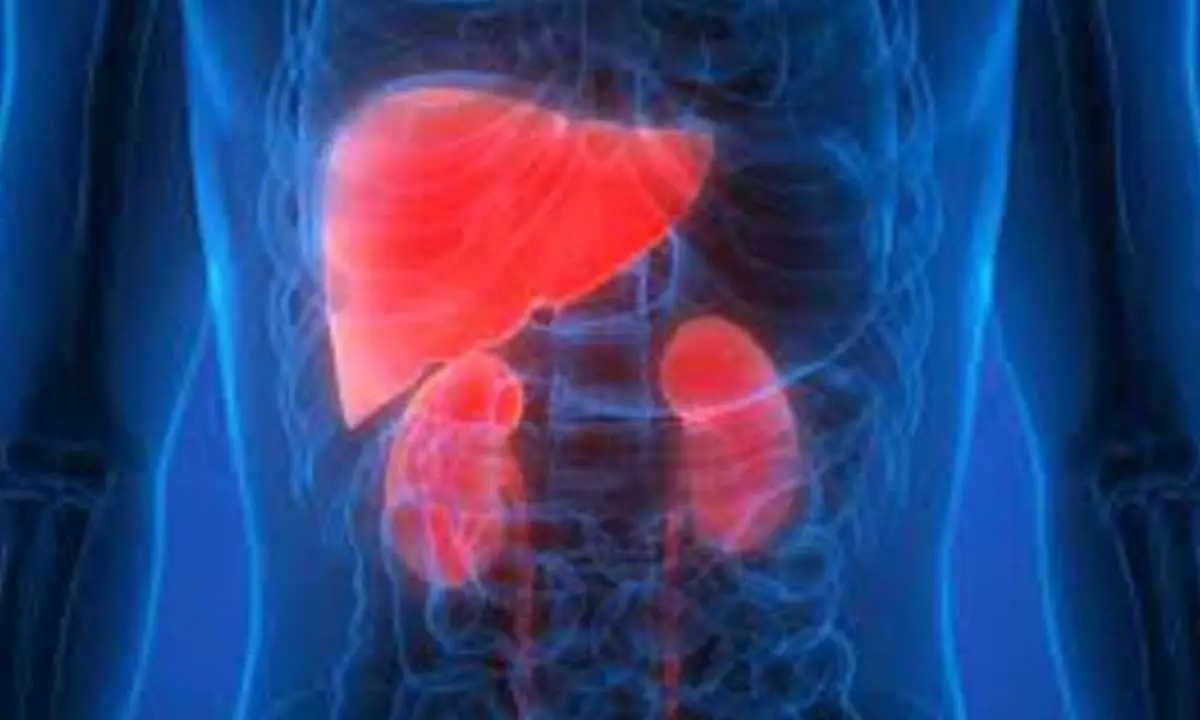Live
- BJP flags plight of primary school
- Sensex surges 855 pts despite geo-political tensions, PSU bank stocks shine
- ED likely to question some Dubai-based Indians in Bengal ration scam case
- Minor quake hits Manipur's Bishnupur district
- BJP's Bihar leaders huddle at Union Minister Giriraj Singh's Delhi residence
- 10 Maoists gunned down in encounter with security forces in Sukma
- K’taka parties keenly await bypoll results, spotlight on high-profile Channapatna
- Hyderabad Student Aryan Reddy Dies in Tragic Gun Misfire Accident on His Birthday in Atlanta
- Iraqi PM, Putin discuss regional situation, energy cooperation over phone
- Pushpa 2 Shooting Still Pending? Will It Release on Time?
Just In
Hepatitis, a liver disorder invading your kidneys


Liver is a vital organ that converts food into nutrients for use by the body and gets rid of toxins. Viral hepatitis is an inflammatory liver condition that is caused by viruses such as hepatitis A, B, C and E.
Liver is a vital organ that converts food into nutrients for use by the body and gets rid of toxins. Viral hepatitis is an inflammatory liver condition that is caused by viruses such as hepatitis A, B, C and E. They can cause acute liver failure, which can carry a high risk of complications if not treated in time. There is a close association between liver failure and kidney disease and this article is aimed to shed light on the less-explored link between hepatitis and its effect on kidney function.
Dr SeerapaniGopaluni,a leading Nephrologist,Consultant at NephroPlus says, “Liver is involved in the process of converting nitrogenous waste from food into less-toxic product called urea, which kidneys eliminate as a waste product in the urine. Liver injury can cause kidney disease in multiple ways. The toxins that accumulate when liver stops working will have a damaging effect on the kidney function. Further, the inflammation caused by the viruses and associated immune response can also lead to kidney damage in susceptible individuals.”
In some cases of hepatitis B and C infections, viruses can directly invade the kidneys, causing kidney disease. Over a period of time, the cumulative effect of toxins, inflammation and direct viral assault can lead to chronic kidney disease (CKD) and, in severe cases, kidney failure.
Dr SeerapaniGopaluni says, “Studies have shown that up to 10-20% of patients with chronic hepatitis B and C may develop kidney disease during their illness. Some of these individuals progress to end-stage renal disease (ESRD), requiring dialysis or kidney transplantation. These statistics underscore the critical need for timely screening and proactive management of kidney health in hepatitis patients. Furthermore, hepatitis is a growing health hazard in haemodialysis (a treatment for kidney failure) patients, if the medical facility that provides haemodialysis does not carefully follow the guidelines for infection control.”
Detecting kidney problems early is vital for preventing irreversible damage and progression to kidney failure. Hepatitis patients should be vigilant about the following warning signs of kidney disease:
• Changes in Urination: Unexplained changes in urination patterns, such as increased frequency, foamy or dark-coloured urine, or the presence of blood, may indicate kidney dysfunction
• Swelling: Oedema or swelling, especially in the legs, ankles, and around the eyes, may signify impaired kidney function, as the kidneys struggle to eliminate excess fluids and waste products from the body
• Fatigue and Weakness: Kidney dysfunction can lead to anaemia, resulting in fatigue, weakness, and difficulty concentrating.
• High Blood Pressure: Persistently elevated blood pressure can be both a cause and consequence of kidney problems in hepatitis patients.
• Electrolyte Imbalances: Imbalances in potassium, calcium, and phosphate levels may occur due to kidney impairment, leading to muscle cramps, bone pain, and abnormal heart rhythms.
Hepatitis patients can take proactive steps to protect their kidney health and reduce the risk of kidney complications.
Tips to Prevent Kidney Problems in Hepatitis Patients:
• Regular medical check-ups: Undergo regular kidney function tests to monitor renal health. Early detection of kidney issues allows for timely intervention and management.
• Treat hepatitis: Work closely with your healthcare provider to manage hepatitis through appropriate antiviral therapies and lifestyle changes. Keeping hepatitis under control can help reduce the impact on kidney function. With the availability of newer medications, the outlook of patients with hepatitis has improved remarkably.
• Maintain a healthy diet: Consume a balanced diet low in sodium, refined sugars, and saturated fats. Opt for fresh fruits, vegetables, whole grains, and lean proteins to support kidney health.
• Stay hydrated: Ensure adequate hydration, as it helps the kidneys flush out toxins and waste products. However, consult with your healthcare provider about the appropriate fluid intake for your condition.
• Avoid nephrotoxic substances: Certain medications, herbal supplements, and over-the-counter pain relievers can harm the kidneys. Always check with your doctor before taking any new medications or supplements.
Safeguarding the health of liver and kidneys is essential for the overall well-being of a patient. Hepatitis patients should remain vigilant about their kidney function, recognising early signs of kidney disease and taking proactive steps to protect their kidneys with the help of experts. With timely intervention and appropriate management, we can mitigate the risk of kidney complications, ensuring a healthier and better future for hepatitis patients.

© 2024 Hyderabad Media House Limited/The Hans India. All rights reserved. Powered by hocalwire.com






